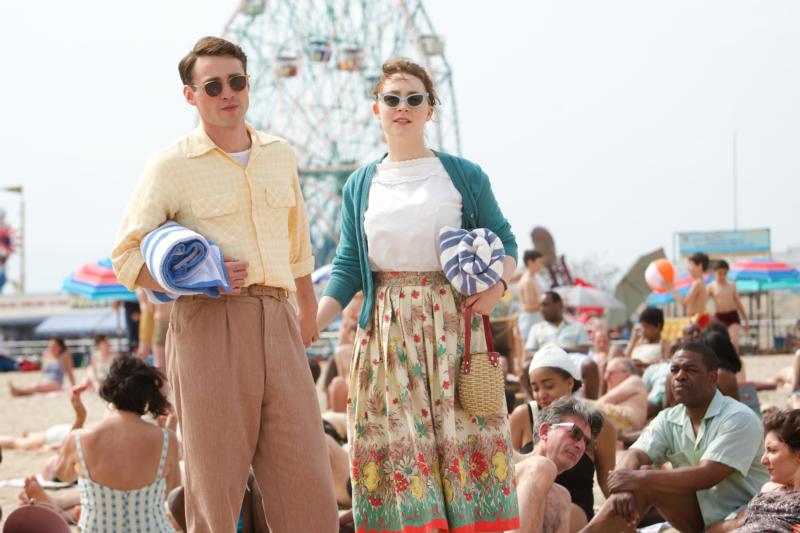NEW YORK (CNS) — Few immigrants to America can be said to have had it easy. Part and parcel of the immigrant experience, no matter the destination, is relegation to the bottom rungs of the socioeconomic ladder.
Ideally, this situation is temporary, as is the sense of dislocation, apprehension and bewilderment so many emigres face.
In the film “Brooklyn” (Fox Searchlight), set during the early 1950s, Eilis Lacey has relatively little to complain about. Her journey out of Ireland and reception in America go about as smoothly as can be imagined. In part because of the time period — decades after the main waves of European immigration and catalysts such as the Great Famine — her material circumstances on either side of the Atlantic are far from dire.
[hotblock]
Yet there’s a more specific reason why her coming to America is frictionless and free of tumult. A Catholic priest, Irish but long stationed in a Brooklyn parish, has paved the way by securing Eilis a job in a local department store and accommodations in a reputable boardinghouse.
The comparative ease of Eilis’ transition doesn’t mean her story, adapted from a novel by Colm Toibin, lacks incident or fails to compel. Just don’t expect the kind of harshness and bleakness found in parallel works such as “‘Tis.” “Brooklyn” is picturesque, meticulously understated and, like star Saoirse Ronan’s graceful performance, dignified. The movie eschews histrionics and doesn’t excoriate anyone or anything. No individual, group or institution is demonized or degraded.
Knowing there are few opportunities for clever young women in their hometown of Enniscorthy, County Wexford, Rose Lacey (Fiona Glascott) has arranged for her sister to emigrate. Despite pangs about leaving Rose behind with their widowed mother, Eilis is eager to go.
Poised and competent, if inexperienced, Eilis joins the ranks of Irish girls seeking new lives in Brooklyn. As she begins working behind the counter at Bartocci’s department store, a protracted bout of homesickness dampens her spirits. Then her sponsor Father Flood (Jim Broadbent) enrolls her in night classes at Brooklyn College and she starts to blossom.
Eilis helps serve Christmas lunch to down-on-their-luck Irishmen in the parish hall. (“These are the men that built the bridges, roads and tunnels,” Father Flood observes.) At a church dance she meets Tony Fiorello (Emory Cohen), a charming young plumber of Italian descent. Their romance seems to ratify her decision to emigrate.
But it’s not quite that simple. Under sad circumstances, she goes home for the first time and, much to her surprise, finds that life in Enniscorthy isn’t so bad. She gains another suitor, Jim Farrell (Domhnall Gleeson), and seriously considers not returning to Brooklyn.
Taking his cue from Toibin’s subtle prose, screenwriter Nick Hornby neatly calibrates the pathos and humor. Much of the latter comes via Mrs. Kehoe, the boardinghouse owner hilariously portrayed by Julie Walters.
Some viewers may feel the movie is too placid and wish for more overt conflict. The fastidious production design does result in images of New York and the Emerald Isle that verge on the idealized. And John Crowley’s directorial decisions make it clear he’s not aiming for gritty realism.
[hotblock2]
On reflection, however, “Brooklyn” is neither whitewashed nor appreciably flawed by naivete. It has more depth and incisiveness than first meets the eye. No doubt assimilation wasn’t as effortless as it appears, even in the early 1950s. But the refusal to manufacture struggle or disruptive plot points matches the film’s laudatory absence of melodrama.
What “Brooklyn” offers is a moving and trenchant look at the subject of migration — including the much-overlooked post-World War II phase of the Irish diaspora — from a woman’s perspective.
Eilis has one serious moral lapse. Yet what gives the film more than surface beauty, and qualifies it as elevated entertainment, is that her subsequent decisions are ethically clear-cut while also coinciding with what the audience is rooting for. Atonement is integral to the movie’s worldview and redemption is possible because mistakes are measured in full context, not in isolation.
“Brooklyn” sees the Catholic Church as playing a vital role in this process and as a constructive force in the daily lives of individuals such as Eilis. What emerges is a portrait of a caring, practical priest and a church that, without fanfare or hubris, provides spiritual guidance and material comfort to its flock.
The film contains a non-explicit premarital encounter, several uses of rough language, and some crude and crass language. The Catholic News Service classification is A-II — adults and adolescents. The Motion Picture Association of America rating is PG-13 — parents strongly cautioned. Some material may be inappropriate for children under 13.
***
John P. McCarthy is a guest reviewer for Catholic News Service.
PREVIOUS: Story of rescued miners in ‘The 33’ should be compelling, but isn’t
NEXT: Interactive book uses technology to empower youth with answers on faith




Share this story